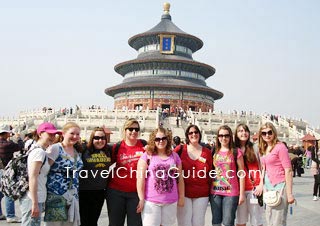Nowadays more and more students are traveling abroad, and China is one of their favorite destinations to experience profound history and culture, as well as picturesque landscape. Going abroad can be expensive, so it is not unusual for students to travel on a budget. It can be a challenge to have a full and enjoyable adventure while trying to save money so we have put together a tip-list for students or any travelers who plan a budget tour:

Transportation is the most expensive aspect of any holiday, but proper preparation saves you money. Try to plan your trip early. As airlines usually release discount tickets several months in advance, so not only will have a wide range of destination choices you will get them at cheap rates. Airlines, such as Tiger Airways, Airasia, and Jetstar Asia for international flights in Asia, and Spring Airlines and West Air for domestic flights in China offer cheap tickets, but there will be extra charges for onboard services such as drink and meals.
Traveling by rail is always a good option for budgeting holiday makers. And for long-distance travelers, an overnight sleeper train ride cannot be better. It is cheap and comfortable, and also saves money on hotels. In China, train tickets are released 60 days in advance, and many are in great demand, so you’d better book all the tickets in advance.
Book Train Tickets with TravelChinaGuide.
Long-distance buses are available between cities and towns. Unlike trains running at fixed hours, buses are more flexible, departing every few minutes or hourly. In addition, you can reach some remote areas by buses. Tickets can be booked one to three days prior to departure. For some less popular routes, you can even buy tickets on the day of travel.
Public buses, subway, and taxies are the major transportation in cities. For visitors on a budget, public buses and subways are the best to save money. You can buy a transportation card for the city you are staying in which gives you discounts (at least 30% off) on bus and subway fares. This is especially recommended in large cities, like Beijing, Shanghai, Xi'an, and Guangzhou.

Hotels are another costly part. Inner city hotels or those near transportation hubs (airports and railway stations) and attractions are usually more expensive. The cheaper hotels are located on the outskirts of the cities; however, the money you save booking a cheap hotel may be taken up traveling to or from the attractions in the cities.
Hostels or youth hostels are popular among budget travelers, spending less for a bed and meeting interesting people. The facilities are not as good as those in hotels, but they are clean.
You may consider renting an apartment if you go with a group of people. Most apartments provide a washing machine and kitchen wares, so you also save the money on laundry and meals.
Couchsurfing is a new form of accommodation especially for student travelers. This is very popular in Europe and America, and is becoming more prevalent in China. You will get a free couch or bed, but the risk is that you live in a stranger’s home. If you are considering this then we recommend you do some research, there are couchsurfing websites, where people can post comments about the hosts.

Try to avoid traveling in peak season, especially during holidays. Holiday times mean high hotel rates, expensive air fares, insufficient train tickets, attractions filled with people, and terrible transportation. What’s more, most attractions have different entrance fees for peak and low seasons. The travel peak seasons in this country are from April to November and the Spring Festival Holiday (late December to February).

Take advantage of the internet. Some attractions have discounted entrance fees if booked online, like the Window of the World in Shenzhen. Many travel websites and shopping sites also sell discount tickets for attractions. It is worthwhile to spending time doing some research.

Visit free attractions. Most museums in China are free to enter and these are good places for students to learn the history and culture of this country. Free parks, city squares, markets, and shopping malls are the best places to learn about and experience Chinese daily life.

Save money when you exchange currency. You can exchange some Chinese RMB in your country before leaving or withdraw cash from ATM machine after arrival (an extra service fee may be charged). The exchange counters in airports usually offer poor exchange rates.

Pack light and pack right. Cheap airlines charge for consigned luggage, so a light bag means you save money. Check the weather forecast before departure, and only take the necessary items with you.

International Student Identity Card holders may enjoy some discounts in shops, museums, hotels, and airlines in Hong Kong, Macau, and some cities in mainland China. Trains and attractions in mainland China do not offer discounts to international students.

Tips for safety:
1. Do not accept water or food from strangers.
2. Do not trust too “warm-hearted” people.
3. Avoid going out alone at night.
4. Do not touch anything you do not intend to buy.
5. Always take care of your purse and mobile phone.
6. Always carry a copy of your passport, visa, and other travel documents.
7. Keep a record of the telephone number of the embassy of your country.
8. Stay with your guide or teacher and tell them if you need to leave your group.

Related Reading:
Student Visa to China China Universities Enrolling Foreign Students- Last updated on Jan. 09, 2023 -
